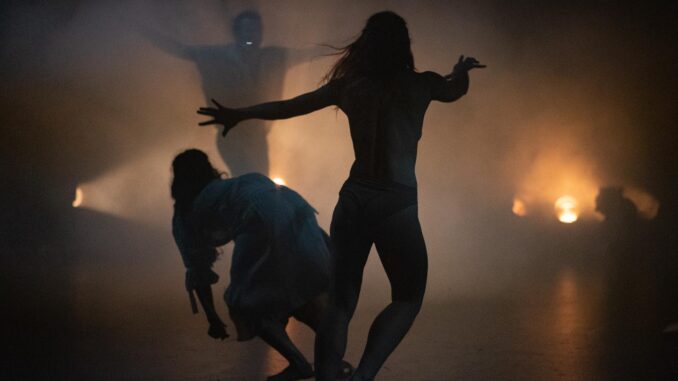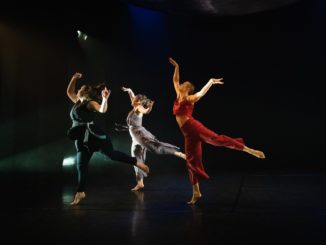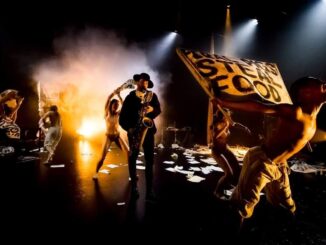
[Mystery and Frenzy]
Partners in life and in work, creatives Lucy Marinkovich and Lucien Johnson as Borderline Arts Ensemble present Strasbourg 1518, their largest major full-length work to date. A tumultuous example of life-imitating-art or vice versa, Strasbourg 1518 is a production that opened in Wellington in March 2020 as Covid-19 infiltrated our shores, closing early due to a pandemic-related scare. Following its recent Auckland season with the full weight of the Auckland Arts Festival’s marketing machinery behind it, Strasbourg 1518 finally gets its full hometown season, a year and a week to the day it first opened.
The “dancing plague” of 1518 has been explored by other choreographers, including Dancenorth Australia Artistic Director Raewyn Hill’s Fugue in 2012, and Jonathan Glazer’s lockdown dance film Strasbourg 1518 in 2020 (commissioned by Artangel and Sadler’s Wells on dancers from Pina Bausch’s company Tanztheatre Wuppertal), the identical name causing Borderline Arts Ensemble much consternation. Borderline’s version sits between these two productions in both chronology and size. Dancing mania (also known as choreomania) was recorded as a social phenomenon in Europe from the 14th to 17th centuries. It’s the type of unlikely event which captures the imagination: part earthy mystery, part supernatural curse, part early modern history.
An integrated and visually rich theatre work, Strasbourg 1518 combines a scripted actor, live and recorded music, and dance. A “community chorus” of partnered dancers is pre-set before the house opens, shuffling slowly in pairs, suggestive of the torturous Depression-era dance marathons of the 1920s and 1930s. Similar to Michael Parmenter’s 2018 OrphEus – a dance opera, Marinkovich utilises the pro-am model to incorporate community performers into the ensemble. Although this creates an atmospheric opening to the work, the section is very long and the chorus are not referenced again. Marinkovic has cast herself as The Maiden, partnered by the effortlessly suave Michael Parmenter as Death. The pair remain as the chorus fade away, dancing an extended social dance style duet created from balancés and their permutations. Nick Blake as The Rational Man narrates the work, beginning physically and emotionally removed from the dancers, but eventually becoming immersed by them. Johnson’s script provides the history of the Strasbourg outbreak, with some injections of humour, and while Blake’s delivery is controlled and possessing of nuance, the content lands as the voice of the status quo embodied – pedagogical and dry.
Strasbourg 1518 boasts a sextet of powerful contemporary dancers as its ensemble; the stage presence and physical dynamism of Hannah Tasker-Poland and Katie Rudd are relentless and vital. Dancers appear in the frenzied largely-improvised movement vocabulary of the infected at full tilt, leaving no room for choreographic intensification, or to explore that most enigmatic element of the narrative – a lone woman stepping out of her door alone to dance. At its crescendo, Markinovich pulls out all the stops in capturing mayhem and hysteria, utilising uncomfortably loud music, throbbing bass, a plethora of props, nudity, stacks of papers, protest banners, masks, dry-humping, guttural shrieks, repetition and the wringing-out of every ounce of the dancers’ stamina. Vignettes of crafted choreography emerge through the work; the most effective are the sextet in a looping rhythmic line, and the rotating wheel with two women floating on the arms of the men, soaring above their earthly suffering.
The choreography and narrative arc of Strasbourg 1518 crescendos unexpectedly early, without having fully earned its emotional intensity, leaving the final third of the work feeling drawn-out and still in need of some editing. Entrances and exits too would benefit from more deliberation and attention. Marinkovich and Parmenter return with a table of red shoes for the dancers – effectively stopping the action – but this richly symbolic dance imagery is barely explored. The work concludes with Parmenter as Death in his black velvet suit, in a measured solo which is a masterclass in stage presence and beauty. He walks away from us into the fading light, harbinger of darkness and a refined conclusion.
Strasbourg 1518 as a production grapples with an enormous amount of content (plague, climate change, religion, patriarchy, capitalism, the value of the arts, corruption, medicine, spiritualism, violence), and an equally overwhelming number of props. In both aspects of the work, some are considered and integrated while others are peripheral, disconnected and referenced only superficially. Rather than stagnate or collapse, Strasbourg 1518 draws momentum from points of connection between its historical inspiration and the current Covid-19 pandemic. For all the challenges 2020 must have thrown at this work, it has grown stronger despite or perhaps because of it.
Strasbourg 1518 plays Circa Theatre 23-28 March, 2021.
Choreography & Direction: Lucy Marinkovich
Composition: Lucien Johnson
Production Design: Lucy Marinkovich, Lauren Hooper, Poppy Serano
Lighting Design: Marcus McShane
SEE ALSO: Auckland Arts Festival season review by Cynthia Lam and Theatreview.org.nz review coverage.




Leave a Reply